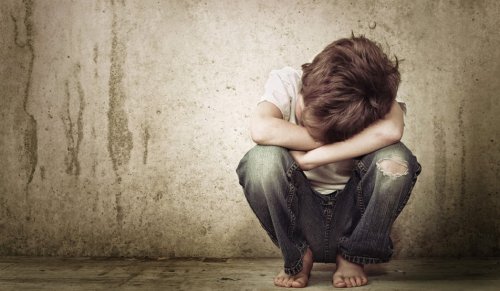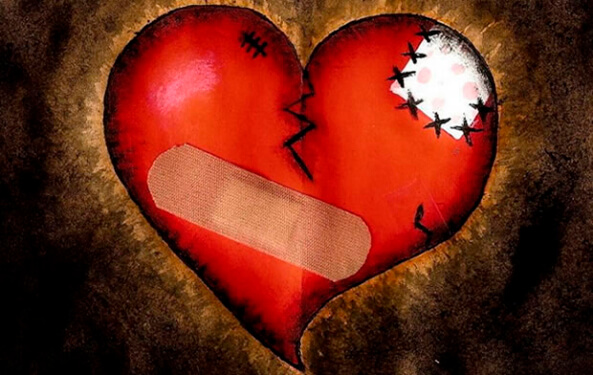Emotional Wounds During Childhood


Reviewed and approved by the psychologist María Alejandra Castro Arbeláez
The emotional wounds that occur during childhood are carried on into adulthood. These wounds feel as though they were just inflicted. Once a child learns to behave, react, feel and think a certain way, it is difficult to change that attitude when they grow up.
According to psychology studies, there are common childhood emotional wounds that influence our outlook on life.
The five most common emotional wounds
Fear of rejection
Whether this fear is unfounded or not, it is based on a fear of social rejection. It could be the feeling of loss of protection from a loved one. A child who is afraid of rejection grows up with that fear to become a person with low self-esteem and little self-love. They become people who sacrifice their own opinion to adopt the criteria of others.
Separation anxiety
This is the fear of being separated from their parents. Feelings of loneliness and abandonment during childhood can form an adult that is fearful, timid and lacking in affection. Separation anxiety can also translate into insecure and submissive adults.
Humiliation
Being humiliated whether in the family or in social circles can cause emotional wounds. This occurs when someone minimizes their qualities and makes fun of them. When they are criticized or disapproved of, this can lead to them becoming either shy and ever-suffering or tyrannical and ruthless.

Injustice
Being the victim of unfair demands or reprimands can make a child insecure and distrustful. When they become adults they can be negative and pessimistic. They sometimes opt to unnecessarily criticize everything that is around them.
Betrayal
When adults do not fulfil the promises they make, the child’s expectations do not become a reality. A child that is hurt this way can become distrustful and antisocial.
Now, in addition to the previous emotional wounds, there are two other ones that are common.
Lack of affection
We believe that lack of affection is one of the most damaging emotional wounds. Anyone who grows up deprived of affection is conditioned to be unhappy.
Affection is just as necessary as food, cleanliness or disease prevention. The brain as well as the rest of the body, needs to be stimulated and provided with everything it needs.
When children suffer from a lack of affection they become more vulnerable to contracting diseases. They might even have a delay in physical development and behavioural disorders. They may also suffer from stress and have trouble when it comes to relating with others.
Lack of affection in childhood is one of the emotional wounds that creeps into adulthood to form cold and insensitive adults. Adults who have little empathy and difficulty feeling love.

Emotional abandonment
Emotional abandonment is another emotional wound that creeps into adulthood.
Children that are deprived of closeness to their parents grow up to feel empty and unappreciated.
Emotional abandonment occurs when parents, either because they don’t have enough time, or simply because they don’t feel affinity to them, stay physically and spiritually distant.
This emotional wound is seen as a type of child abuse, that just as with lack of affection, has the power to destroy a person who grows up with it. It is sometimes a wound that leads to depression and chronic sadness.
How to prevent emotional wounds?
In order to prevent inflicting emotional wounds to your children we recommend:
- Dedicating more of your time to raising and attending to them. Do not delegate the task to third parties.
- Speak to them about topics that interest them. Ask about their points of views and try to answer their questions.
- Never compare your child with others. If you want your child to get good grades like others, it is better to encourage them to study.
- Address their fears don’t minimize them.
- Reward, praise, and applaud their achievements. By doing this you will raise their self-esteem.
- Spend time with them. You can also ask for the help of a specialist to help deal with issues such as the death of a relative, divorce, shyness and the truth of their origin (in the case of adoptions).
There are many tips that can help. However, the way to not cause any emotional wounds to children is in the hands of the family
The emotional wounds that occur during childhood are carried on into adulthood. These wounds feel as though they were just inflicted. Once a child learns to behave, react, feel and think a certain way, it is difficult to change that attitude when they grow up.
According to psychology studies, there are common childhood emotional wounds that influence our outlook on life.
The five most common emotional wounds
Fear of rejection
Whether this fear is unfounded or not, it is based on a fear of social rejection. It could be the feeling of loss of protection from a loved one. A child who is afraid of rejection grows up with that fear to become a person with low self-esteem and little self-love. They become people who sacrifice their own opinion to adopt the criteria of others.
Separation anxiety
This is the fear of being separated from their parents. Feelings of loneliness and abandonment during childhood can form an adult that is fearful, timid and lacking in affection. Separation anxiety can also translate into insecure and submissive adults.
Humiliation
Being humiliated whether in the family or in social circles can cause emotional wounds. This occurs when someone minimizes their qualities and makes fun of them. When they are criticized or disapproved of, this can lead to them becoming either shy and ever-suffering or tyrannical and ruthless.

Injustice
Being the victim of unfair demands or reprimands can make a child insecure and distrustful. When they become adults they can be negative and pessimistic. They sometimes opt to unnecessarily criticize everything that is around them.
Betrayal
When adults do not fulfil the promises they make, the child’s expectations do not become a reality. A child that is hurt this way can become distrustful and antisocial.
Now, in addition to the previous emotional wounds, there are two other ones that are common.
Lack of affection
We believe that lack of affection is one of the most damaging emotional wounds. Anyone who grows up deprived of affection is conditioned to be unhappy.
Affection is just as necessary as food, cleanliness or disease prevention. The brain as well as the rest of the body, needs to be stimulated and provided with everything it needs.
When children suffer from a lack of affection they become more vulnerable to contracting diseases. They might even have a delay in physical development and behavioural disorders. They may also suffer from stress and have trouble when it comes to relating with others.
Lack of affection in childhood is one of the emotional wounds that creeps into adulthood to form cold and insensitive adults. Adults who have little empathy and difficulty feeling love.

Emotional abandonment
Emotional abandonment is another emotional wound that creeps into adulthood.
Children that are deprived of closeness to their parents grow up to feel empty and unappreciated.
Emotional abandonment occurs when parents, either because they don’t have enough time, or simply because they don’t feel affinity to them, stay physically and spiritually distant.
This emotional wound is seen as a type of child abuse, that just as with lack of affection, has the power to destroy a person who grows up with it. It is sometimes a wound that leads to depression and chronic sadness.
How to prevent emotional wounds?
In order to prevent inflicting emotional wounds to your children we recommend:
- Dedicating more of your time to raising and attending to them. Do not delegate the task to third parties.
- Speak to them about topics that interest them. Ask about their points of views and try to answer their questions.
- Never compare your child with others. If you want your child to get good grades like others, it is better to encourage them to study.
- Address their fears don’t minimize them.
- Reward, praise, and applaud their achievements. By doing this you will raise their self-esteem.
- Spend time with them. You can also ask for the help of a specialist to help deal with issues such as the death of a relative, divorce, shyness and the truth of their origin (in the case of adoptions).
There are many tips that can help. However, the way to not cause any emotional wounds to children is in the hands of the family
All cited sources were thoroughly reviewed by our team to ensure their quality, reliability, currency, and validity. The bibliography of this article was considered reliable and of academic or scientific accuracy.
- Pérez, V. R., & Martínez, L. M. R. (2015). Apego, miedo, estrategias de afrontamiento y relaciones intrafamiliares en niños. Psicología y salud, 25(1), 91-101. http://psicologiaysalud.uv.mx/index.php/psicysalud/article/view/1342
- Stamateas, B. (2012). Heridas emocionales: sanar el pasado para un mañana mejor. B De Books.
- Valiente, R. M., Sandín, B., & Chorot, P. (2002). Miedos comunes en niños y adolescentes: Relación con la sensibilidad a la ansiedad, el rasgo de ansiedad, la afectividad negativa y la depresión. Revista de psicopatología y Psicología clínica, 7(1), 61-70. http://revistas.uned.es/index.php/RPPC/article/view/3922
This text is provided for informational purposes only and does not replace consultation with a professional. If in doubt, consult your specialist.








